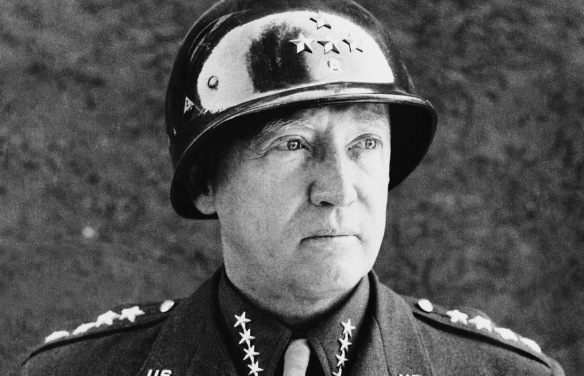On February 1, 1945, Eisenhower wrote a memo ranking the military capabilities of his subordinate American generals in Europe. Bradley and Army Air Force General Carl Spaatz shared the number one position, while Walter Bedell Smith was ranked number two, and Patton number three. Eisenhower revealed his reasoning in a 1946 review of the book Patton and his Third Army: “George Patton was the most brilliant commander of an army in the open field that our or any other service produced. But his army was part of a whole organization and his operations part of a great campaign.” Eisenhower believed that other generals such as Bradley should be given the credit for planning the successful Allied campaigns across Europe in which Patton was merely “a brilliant executor”.
Notwithstanding Eisenhower’s estimation of Patton’s abilities as a strategic planner, his overall view of Patton’s military value in achieving Allied victory in Europe can best be seen in Eisenhower’s refusal to even consider sending Patton home after the slapping incidents of 1943, after which he privately remarked, “Patton is indispensable to the war effort – one of the guarantors of our victory.” As Assistant Secretary of War John J. McCloy told Eisenhower: “Lincoln’s remark after they got after Grant comes to mind when I think of Patton – `I can’t spare this man, he fights’.” After Patton’s death, Eisenhower would write his own tribute: “He was one of those men born to be a soldier, an ideal combat leader . It is no exaggeration to say that Patton’s name struck terror at the hearts of the enemy.”
Bradley’s view of Patton was decidedly negative. Patton received scant praise in Bradley’s memoirs, in which the latter made it clear that had he been Patton’s superior in Sicily in 1943, he not only would have relieved Patton of command immediately but “would have had nothing more to do with him”. The two men were polar opposites in personality, and there is considerable evidence that Bradley disliked Patton both personally and professionally. President Franklin D. Roosevelt appeared to greatly esteem Patton and his abilities, stating “he is our greatest fighting general, and sheer joy.” On the other hand, Roosevelt’s successor, Harry S. Truman, appears to have taken an instant dislike to Patton, at one point comparing both him and Douglas MacArthur to George Armstrong Custer.
For the most part, British commanders did not hold Patton in high regard. Field Marshal Alan Brooke noted in January 1943 that “I had heard of him, but I must confess that his swashbuckling personality exceeded my expectation. I did not form any high opinion of him, nor had I any reason to alter this view at any later date. A dashing, courageous, wild and unbalanced leader, good for operations requiring thrust and push but at a loss in any operation requiring skill and judgment.” One possible exception was Montgomery. Although the latter’s rivalry with Patton was well known, Montgomery appears to have admired Patton’s ability to command troops in the field, if not his strategic judgment. Other Allied commanders were more impressed, the Free French in particular. General Henri Giraud was incredulous when he heard of Patton’s dismissal by Eisenhower in late 1945, and invited him to Paris to be decorated by President Charles de Gaulle at a state banquet. At the banquet, President de Gaulle gave a speech placing Patton’s achievements alongside those of Napoleon. Soviet leader Joseph Stalin was apparently an admirer, stating that the Red Army could neither have planned nor executed Patton’s rapid armored advance across France.
While Allied leaders expressed mixed feelings on Patton’s capabilities, the German High Command was noted to have more respect for him than for any other Allied commander after 1943. Adolf Hitler reportedly called him “that crazy cowboy general.” Many German field commanders were generous in their praise of Patton’s leadership following the war, and many of its highest commanders also held his abilities in high regard.
Erwin Rommel credited Patton with executing “the most astonishing achievement in mobile warfare.” Generaloberst Alfred Jodl, chief of staff of the German Army, stated that Patton “was the American Guderian. He was very bold and preferred large movements. He took big risks and won big successes.” Generalfeldmarschall Albert Kesselring noted that “Patton had developed tank warfare into an art, and understood how to handle tanks brilliantly in the field. I feel compelled, therefore, to compare him with Generalfeldmarschall Rommel, who likewise had mastered the art of tank warfare. Both of them had a kind of second sight in regard to this type of warfare.” Referring to the escape of the Afrika Korps after the Battle of El Alamein, Fritz Bayerlein opined that “I do not think that General Patton would let us get away so easily.” In an interview conducted for Stars and Stripes just after his capture, Field Marshal Gerd von Rundstedt stated simply of Patton, “He is your best.”
